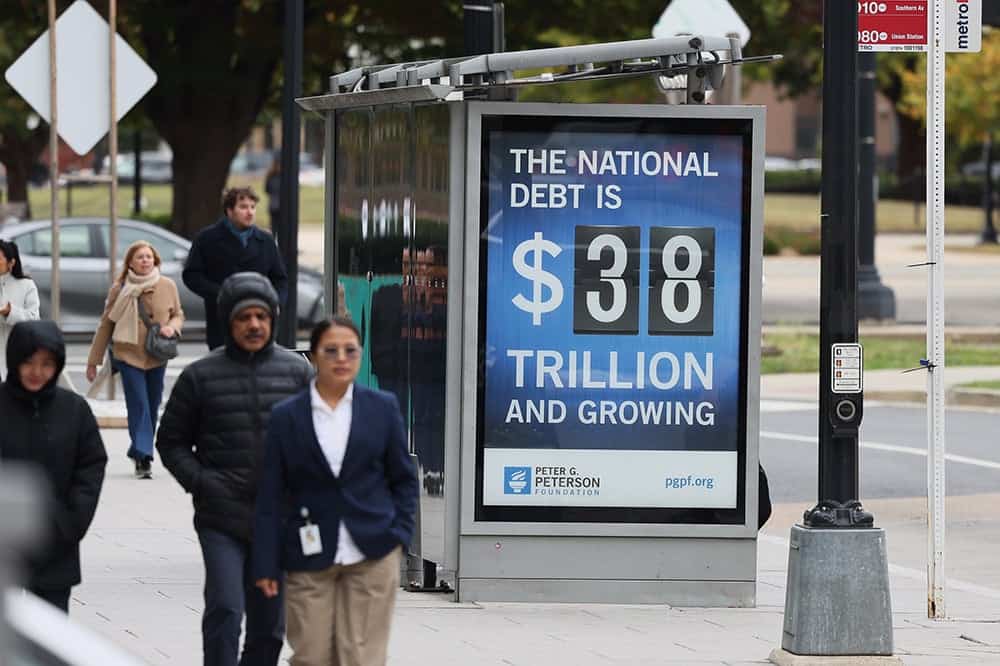New Election Poll: National Debt Motivating Majority of Voters in Advance of Next Week’s Midterms

Candidates from Both Parties Can Add Late Support by Showing Willingness to Reduce the National Debt in a Bipartisan Fashion
NEW YORK (October 30, 2018) — With one week until voters elect a new Congress in the 2018 Midterm Elections, the national debt is a driving factor for a majority of Americans, according to a new poll released today by the Peter G. Peterson Foundation.
Despite the lack of attention within Washington, voters of all political persuasions say the national debt is an important factor in their vote for Congress this year, and are more inclined to vote for candidates from either party who are willing to work in a bipartisan way to fix the problem, according to the survey prepared by a bipartisan team of polling firms, Global Strategy Group and North Star Opinion Research.
Key findings include:
- The $21.6 trillion national debt is a motivating election issue for voters of all political stripes, with 74 percent of Democrats, 72 percent of independents and 77 percent of Republicans saying it’s an important factor in their vote.
- Candidates from both political parties can pick up late support by showing that they are willing to work in bipartisan fashion to reduce the debt.
- While 52% of voters say they would consider a Republican candidate for Congress absent any other information about the candidate, support rises 11 points to 63% for a Republican candidate “who is willing to work with Democrats on a plan to reduce the national debt.”
- Similarly, the share of voters who are willing to vote for a Democratic candidate rises six points, from 61% to 67%, when they hear the candidate is willing to work with Republicans on a plan to reduce the debt.
- More than three in four voters (77%) want the next Congress to increase focus on the debt, no matter which party wins the majority. This holds true across party lines, including 74% of Democrats, 82% of independent voters, and 75% of Republicans.
More broadly, voters want the next Congress and the President to make the nation’s fiscal health a top priority, according to the Peterson Foundation’s Fiscal Confidence Index, a monthly measure of public attitudes about the national debt and the efforts by elected leaders to address America’s fiscal challenges. The October Fiscal Confidence Index, modeled after the Consumer Confidence Index, is 62 (100 is neutral).
Heading into the 2018 midterm elections, voters nationwide feel that the country is on the wrong track in addressing the national debt (38% right direction/53% wrong track), and eight in 10 voters (80%) believe that the President and Congress should be spending more time addressing the problem.
“The national debt is a key issue for the vast majority of voters as they head to the polls,” said Michael A. Peterson, CEO of the Peter G. Peterson Foundation. “Lawmakers have made irresponsible fiscal choices that have grown the national debt to dangerous levels, putting critical federal programs and future generations at risk. We’ll return to trillion-dollar deficits as early as this year, and interest costs are growing rapidly, consuming resources that could be used for investing in national priorities like education, infrastructure and national defense. This election season, voters are looking for leaders who will restore fiscal order and secure our future.”
The Fiscal Confidence Index measures public opinion about the national debt by asking six questions in three key areas:
- CONCERN: Level of concern and views about the direction of the national debt.
- PRIORITY: How high a priority addressing the debt should be for elected leaders.
- EXPECTATIONS: Expectations about whether the debt situation will get better or worse in the next few years.
The survey results from these three areas are weighted equally and averaged to produce the Fiscal Confidence Index value. The Fiscal Confidence Index, like the Consumer Confidence Index, is indexed on a scale of 0 to 200, with a neutral midpoint of 100. A reading above 100 indicates positive sentiment. A reading below 100 indicates negative sentiment.
Fiscal Confidence Index Key Data Points:
- The October 2018 Fiscal Confidence Index value is 62(The September value was 61 and the August value was 59.)
- The current Fiscal Confidence Index score for CONCERN about the debt is 64, indicating deep concern about the debt. The score for debt as a PRIORITY that leaders must address is 32, indicating that Americans want elected leaders to make addressing long-term debt a high priority. The score for EXPECTATIONS about progress on the debt is 89. The Fiscal Confidence Index is the average of these three sub-category scores.
- For a description of the complete methodology, see the Appendix below.
The Peter G. Peterson Foundation commissioned this poll by the Global Strategy Group and North Star Opinion Research to survey public opinion on the national debt. The nationwide poll included 1,000 U.S. registered voters, surveyed by telephone between October 23, 2018 and October 26, 2018. The poll has a margin of error of +/- 3.1%. The poll examined voters’ opinions on the national debt, political leadership, and America’s fiscal and economic health.
Detailed poll results can be found online at: www.pgpf.org/FiscalConfidenceIndex.
About the Peter G. Peterson Foundation
The Peter G. Peterson Foundation is a nonprofit, nonpartisan organization that is dedicated to increasing public awareness of the nature and urgency of key fiscal challenges threatening America’s future, and to accelerating action on them. To address these challenges successfully, we work to bring Americans together to find and implement sensible, long-term solutions that transcend age, party lines and ideological divides in order to achieve real results. To learn more, please visit www.pgpf.org.
APPENDIX: Fiscal Confidence Index Methodology and Questions
- The Fiscal Confidence Index is released monthly by the Peter G. Peterson Foundation.
- The Fiscal Confidence Index value is based on six questions in three categories.
- As is done with the Consumer Confidence Index, the first step in calculating the Fiscal Confidence Index is determining the “Relative Value” for each question. This calculation is made by taking the positive response for each question and dividing it by the sum of the positive and negative responses. Each question was asked on a four-point scale, and answers were weighted according to intensity, with the strongest responses counting twice as much as the middle responses (“much” better or worse answers count twice as heavily as “somewhat” better or worse answers).
- The scores for the Concern, Priority, and Expectations categories are determined by averaging the scores derived from the two questions in each category.
- The Fiscal Confidence Index value is converted from the Relative Value to place it on a scale on which 100 indicates equal positive and negative sentiment, while values below 100 indicate negative sentiment and values above 100 indicate positive sentiment.
- The questions are as follows:
| CONCERN (64) | |||
|---|---|---|---|
| Thinking about our national debt over the last few years, would you say your level of concern has increased or decreased? ◊ Is that a lot or just a little? |
October 2018 | September 2018 | August 2018 |
| Increased a lot | 37% | 41% | 37% |
| Increased a little | 24% | 18% | 24% |
| Decreased a little | 15% | 15% | 13% |
| Decreased a lot | 9% | 8% | 7% |
| (No change) | 12% | 14% | 15% |
| (Don’t Know/Refused) | 4% | 4% | 4% |
| INCREASED (NET) | 61% | 58% | 61% |
| DECREASED (NET) | 23% | 23% | 20% |
| When it comes to addressing our national debt, would you say things in the United States are heading in the right direction or do you think things are off on the wrong track? ◊ Do you feel that way strongly or just somewhat? |
October 2018 | September 2018 | August 2018 |
| Right direction-Strongly | 20% | 19% | 21% |
| Right direction-Somewhat | 18% | 17% | 17% |
| Wrong track-Somewhat | 16% | 15% | 18% |
| Wrong track-Strongly | 36% | 38% | 35% |
| (Neither/Mixed) | 3% | 4% | 4% |
| (Don’t Know/Refused) | 6% | 6% | 7% |
| RIGHT DIRECTION (NET) | 38% | 36% | 37% |
| WRONG TRACK (NET) | 53% | 54% | 53% |
| PRIORITY (32) | |||
|---|---|---|---|
| Some people say that addressing the national debt should be among the president and Congress’ top 3 priorities. Do you agree or disagree? ◊ Do you feel that way strongly or just somewhat? |
October 2018 | September 2018 | August 2018 |
| Strongly agree | 41% | 43% | 47% |
| Somewhat agree | 32% | 24% | 26% |
| Somewhat disagree | 15% | 16% | 13% |
| Strongly disagree | 8% | 10% | 8% |
| (Don’t Know/Refused) | 4% | 6% | 6% |
| AGREE (NET) | 73% | 68% | 73% |
| DISAGREE (NET) | 23% | 26% | 21% |
| And when it comes to our national debt, do you think it is an issue that the president and Congress should spend more time addressing or less time addressing? ◊ Would you say a lot (more or less) time or just a little? |
October 2018 | September 2018 | August 2018 |
| A lot more time | 52% | 53% | 56% |
| A little more time | 28% | 22% | 26% |
| A little less time | 7% | 8% | 5% |
| A lot less time | 4% | 6% | 4% |
| (The same amount of time) | 3% | 4% | 3% |
| (Don’t Know/Refused) | 6% | 6% | 6% |
| MORE TIME (NET) | 80% | 75% | 82% |
| LESS TIME (NET) | 11% | 14% | 9% |
| EXPECTATIONS (89) | |||
|---|---|---|---|
| And thinking about our national debt over the next few years, do you expect the problem to get better or worse? ◊ Is that much (better or worse) or just somewhat (better or worse)? |
October 2018 | September 2018 | August 2018 |
| Much better | 12% | 13% | 15% |
| Somewhat better | 20% | 17% | 17% |
| Somewhat worse | 26% | 26% | 26% |
| Much worse | 32% | 35% | 33% |
| (No change) | 3% | 3% | 2% |
| (Don’t know/Refused) | 7% | 6% | 7% |
| BETTER (NET) | 33% | 30% | 32% |
| WORSE (NET) | 57% | 60% | 59% |
| And when it comes to our national debt, are you optimistic or pessimistic that the United States will be able to make progress on our national debt over the next few years? ◊ Would you say you are very (optimistic or pessimistic) or just somewhat? |
October 2018 | September 2018 | August 2018 |
| Very optimistic | 20% | 21% | 22% |
| Somewhat optimistic | 33% | 29% | 30% |
| Somewhat pessimistic | 18% | 17% | 16% |
| Very pessimistic | 21% | 25% | 24% |
| (Neither/Mixed) | 2% | 4% | 2% |
| (Don’t Know/Refused) | 5% | 5% | 5% |
| OPTIMISTIC (NET) | 54% | 50% | 52% |
| PESSIMISTIC (NET) | 39% | 42% | 41% |
Further Reading
Lawmakers are Running Out of Time to Fix Social Security
Without reform, Social Security could be depleted as early as 2032, with automatic cuts for beneficiaries.
What Is the National Debt Costing Us?
Programs that millions of Americans depend on and care about may be feeling a squeeze from interest costs on our high and rising national debt.
Interest Costs on the National Debt Are Reaching All-Time Highs
The most recent CBO projections confirm once again that America’s fiscal outlook is on an unsustainable path — increasingly driven by higher interest costs.


